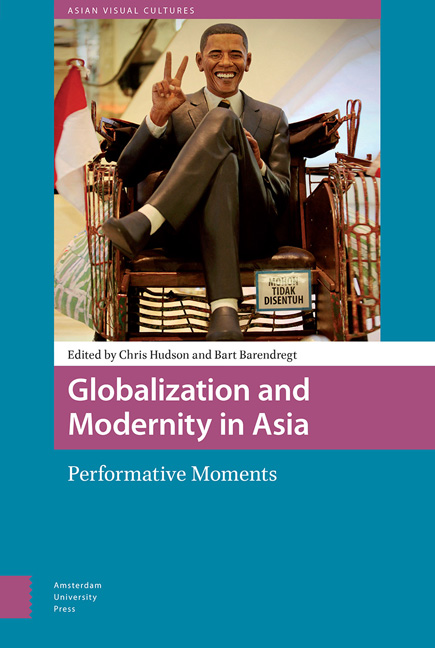Book contents
- Frontmatter
- Contents
- List of Figures
- Acknowledgments
- 1 Global Imaginaries and Performance in Asia
- 2 Globalizing the Imagination: Introductory Reflections
- 3 Weddings, Yoga, Hook-ups: Performed Identities and Technology in Bali
- 4 Super Premium Soft Double Vanilla Rich and the Ideal of Convenience in Japan
- 5 Unearthing the Past and Re-imagining the Present: Contemporary Art and Muslim Politics in a Post-9/11 World
- 6 Keeping Communists Alive in Singapore
- 7 Performative Pedagogies: Lifestyle Experts on Indian Television
- 8 Performing Cities: The Philippines Pavilion at the 2010 Shanghai International Exposition
- 9 Mobile Performance and the In-between: Yogyakarta Comes to Melbourne
- 10 An Islamist Flash Mob in the Streets of Shah Alam: Unstable Genres for Precarious Times
- 11 Pure Love?: Sanitized, Gendered and Multiple Modernities in Chinese Cinemas
- 12 Yogya on Stage
- Index
6 - Keeping Communists Alive in Singapore
Published online by Cambridge University Press: 11 December 2020
- Frontmatter
- Contents
- List of Figures
- Acknowledgments
- 1 Global Imaginaries and Performance in Asia
- 2 Globalizing the Imagination: Introductory Reflections
- 3 Weddings, Yoga, Hook-ups: Performed Identities and Technology in Bali
- 4 Super Premium Soft Double Vanilla Rich and the Ideal of Convenience in Japan
- 5 Unearthing the Past and Re-imagining the Present: Contemporary Art and Muslim Politics in a Post-9/11 World
- 6 Keeping Communists Alive in Singapore
- 7 Performative Pedagogies: Lifestyle Experts on Indian Television
- 8 Performing Cities: The Philippines Pavilion at the 2010 Shanghai International Exposition
- 9 Mobile Performance and the In-between: Yogyakarta Comes to Melbourne
- 10 An Islamist Flash Mob in the Streets of Shah Alam: Unstable Genres for Precarious Times
- 11 Pure Love?: Sanitized, Gendered and Multiple Modernities in Chinese Cinemas
- 12 Yogya on Stage
- Index
Summary
Abstract
Prominent Singapore filmmaker Tan Pin Pin's documentary on nine ageing members of the Malayan Communist Party who were forced to leave Singapore decades ago, To Singapore with Love (2013), highlights the contentious issues around questions of exile, belonging, and the attachment to nation in a globalized environment. In an attempt to silence voices from exile, the film was banned by Singapore authorities. In examining the performance of such voices, this chapter considers the potential for film to generate renewed interest in the politics of nation in a global city. The power of cinematic narrative performativities to unsettle state-sanctioned orthodoxies and call into question the limits to civic freedoms is also discussed.
Keywords: Singapore, film, performance, nation, voices from exile
In July 2014, the National University of Singapore (NUS) Museum and Cultural Studies Research Cluster, Asia Research Institute, NUS, along with the filmmaker, Tan Pin Pin, submitted the hour-long documentary film To Singapore with Love (2014) for censorship clearance. The film was to be included in a two-day screening of three of Tan's films. After two months of waiting, the Censorship Board gave its decision. On 10 September 2014, the film was denied a classification or rating (Not Allowed for All Ratings, NAR), which effectively means that it cannot be commercially released. The film in question documents the film-maker's interviews with nine Singaporeans in exile: Six are aging ex-members of the Malayan Communist Party (MCP) who are disallowed a return to Singapore and currently reside in Thailand and Malaysia. The other three are self-exiled under different circumstances. Ho Juan Thai, expecting to be detained without trial under the Internal Security Act (ISA), amended the expiry date on his passport in order to get out of the country; medical surgeon Dr. Ang Swee Chai, who joined her husband the late Francis Khoo in self-exile (as Khoo faced imminent detention without trial as a political dissident); and Tan Wah Piow, who, after being released from jail for student activism, went into exile to avoid conscription into the national military service in the expectation that he would be ‘ill-treated.’ The three left Singapore at different times in the 1970s and 1980s and currently reside in London. The interviews cover primarily their current lives; less is mentioned of the activities that led to their voluntary or involuntary exile, although the ex-communists showed photos of themselves in army fatigues.
- Type
- Chapter
- Information
- Globalization and Modernity in AsiaPerformative Moments, pp. 89 - 106Publisher: Amsterdam University PressPrint publication year: 2018

